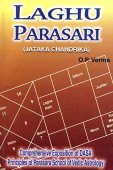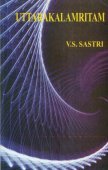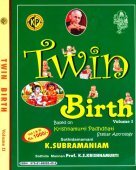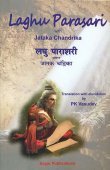Lagna: 20 definitions
Introduction:
Lagna means something in Hinduism, Sanskrit, the history of ancient India, Marathi, Hindi. If you want to know the exact meaning, history, etymology or English translation of this term then check out the descriptions on this page. Add your comment or reference to a book if you want to contribute to this summary article.
Alternative spellings of this word include Lagn.
In Hinduism
Jyotisha (astronomy and astrology)
Source: Wisdom Library: Brihat Samhita by VarahamihiraLagna (लग्न) refers to that particular sign of the zodiac which is cut by the eastern horizon at the time of one’s birth.—In lunar eclipses those persons will suffer in the sign of whose nativity in which the Sun was, the moon happens to be eclipsed. Again, if an eclipse should occur in the sign in which the Sun was in one’s nativity, then the persons on his father’s side will suffer; if in the sign in which the Moon was in one’s nativity then the persons on his mother's side will suffer. Again that person will also suffer in whose Lagna or Nakṣatra the Sun or Moon is eclipsed.
Source: Google Books: Studies in the History of the Exact Sciences (Astronomy)Lagna (लग्न) refers to an “auspicious moment”, according to the Nāradasaṃhitā verse 29.86-95 (pp. 181-184), a Sanskrit work on astrology having the Saralā commentary by Vasatirāma Śarmā.—Accordingly, “The best of the astrologers should measure (dadyāt) that auspicious moment [i.e., lagna] by means of the water clock. With a height of six aṅgulas, with a width of twelve aṅgulas, let a copper bowl be made, like a hemisphere, with ten palas of weight. It is filled in the duration of sixty palas (or, with sixty palas of water), and sinks sixty times in a day and night.
Source: Wikibooks (hi): Sanskrit Technical TermsLagna (लग्न).—The rising point of the ecliptic i.e., orient ecliptic point. Note: Lagna is a Sanskrit technical term used in ancient Indian sciences such as Astronomy, Mathematics and Geometry.

Jyotisha (ज्योतिष, jyotiṣa or jyotish) refers to ‘astronomy’ or “Vedic astrology” and represents the fifth of the six Vedangas (additional sciences to be studied along with the Vedas). Jyotisha concerns itself with the study and prediction of the movements of celestial bodies, in order to calculate the auspicious time for rituals and ceremonies.
Kavya (poetry)
Source: Brill: Śaivism and the Tantric Traditions (kavya)Lagna (लग्न) refers to “(being) stuck (from decapitations)”, according to Bāṇa’s Kādambarī (p. 225-226).—Accordingly, while describing the shire of the Goddess Caṇḍikā, “[Then follows the image of the Goddess Caṇḍikā, which matches the conception of Kālarātri in the passage from the Mahābhārata:] Her feet were never bereft of cloths [dyed with] red lac thrown upon the mound of her seat [on the altar] as if they were the lives of all creatures arrived there for shelter; she resembled an inhabitant of the Underworld because of the intense darkness obstructed [only] by the flashes from axes, spears, etc., weapons deadly for beings, that seemed to hold nets of hair stuck from decapitations (śirascheda-lagna) because of the reflections of black yak-tail whisks cast [upon their surfaces]; [...]”.

Kavya (काव्य, kavya) refers to Sanskrit poetry, a popular ancient Indian tradition of literature. There have been many Sanskrit poets over the ages, hailing from ancient India and beyond. This topic includes mahakavya, or ‘epic poetry’ and natya, or ‘dramatic poetry’.
Purana and Itihasa (epic history)
Source: archive.org: Shiva Purana - English TranslationLagna (लग्न) refers to the “auspicious hour (free of defects)”, according to the Śivapurāṇa 2.3.39 (“The gods arrive at Kailāsa”).—Accordingly, as Śiva said to Nārada: “O excellent sage, listen to us lovingly. I am speaking to you because you are the crest-jewel of my devotees. At your bidding a great penance has been performed by Pārvatī. Propitiated by her I have granted her the boon of my being her husband. Being subservient to her by her devotion I shall marry her. The auspicious hour (lagna) free of defects has been fixed by the seven sages. O Nārada, the marriage will take place after seven days from today. Following the worldly conventions I shall make a grand festival of the same”.

The Purana (पुराण, purāṇas) refers to Sanskrit literature preserving ancient India’s vast cultural history, including historical legends, religious ceremonies, various arts and sciences. The eighteen mahapuranas total over 400,000 shlokas (metrical couplets) and date to at least several centuries BCE.
Sports, Arts and Entertainment (wordly enjoyments)
Source: archive.org: Syainika Sastra of Rudradeva with English Translation (art)Lagna (लग्न) refers to “clinging (to one’s neck)”, according to the Śyainika-śāstra: a Sanskrit treatise dealing with the divisions and benefits of Hunting and Hawking, written by Rājā Rudradeva (or Candradeva) in possibly the 13th century.—Accordingly, [while discussing the outlines of hawking]: “[...] The enjoyment of hunting is more exquisite than even the enjoyment of women. For, the pleasures of hunting fascinate and draw away even the husband of the woman whose eyes resemble those of the frightened stags. If the enjoyment were not so exquisite then why should men forsake their mistresses clinging to their neck (kaṇṭha-lagna), and go abroad in cold nights? [...]”.

This section covers the skills and profiencies of the Kalas (“performing arts”) and Shastras (“sciences”) involving ancient Indian traditions of sports, games, arts, entertainment, love-making and other means of wordly enjoyments. Traditionally these topics were dealt with in Sanskrit treatises explaing the philosophy and the justification of enjoying the pleasures of the senses.
India history and geography
Source: Cologne Digital Sanskrit Dictionaries: Indian Epigraphical GlossaryLagna.—(IA 17; SII 1), an astronomical term; the rising of a sign of the zodiac or its passing the meridian. See Ind. Ant., Vol. XVIII, pp. 16 ff. Note: lagna is defined in the “Indian epigraphical glossary” as it can be found on ancient inscriptions commonly written in Sanskrit, Prakrit or Dravidian languages.

The history of India traces the identification of countries, villages, towns and other regions of India, as well as mythology, zoology, royal dynasties, rulers, tribes, local festivities and traditions and regional languages. Ancient India enjoyed religious freedom and encourages the path of Dharma, a concept common to Buddhism, Hinduism, and Jainism.
Languages of India and abroad
Marathi-English dictionary
Source: DDSA: The Molesworth Marathi and English Dictionarylagna (लग्न).—n (S) Marriage or matrimony: also nuptials or a wedding. v kara, hō. 2 The marriageunion as effected at the auspicious juncture. v lāva, lāga. 3 The oblique ascension; the divisions of the equator as rising in succession with each sign in an oblique sphere. lagna nāhaṇēṃ To undergo the ablutions and other ceremonies prescribed for the subject of the rite of marriage. lagnācā That is united in wedlock;--used of the husband or of the wife.
--- OR ---
lagna (लग्न).—p S Joined to or connected with. 2 fig. Attached to or applying to; set upon or towards; assiduously engaged in.
Source: DDSA: The Aryabhusan school dictionary, Marathi-Englishlagna (लग्न).—n Marriage; a wedding. p Joined to.
Marathi is an Indo-European language having over 70 million native speakers people in (predominantly) Maharashtra India. Marathi, like many other Indo-Aryan languages, evolved from early forms of Prakrit, which itself is a subset of Sanskrit, one of the most ancient languages of the world.
Sanskrit dictionary
Source: DDSA: The practical Sanskrit-English dictionaryLagna (लग्न).—p. p.
1) Adhered or clung to, stuck, held fast; लताविटपे एकावली लग्ना (latāviṭape ekāvalī lagnā) V.1.
2) Touching, coming in contact with.
3) Attached to, connected with.
4) Clinging or sticking to, remaining on; उवाच रामं संप्रेक्ष्य पङ्कलग्न इव द्विपः (uvāca rāmaṃ saṃprekṣya paṅkalagna iva dvipaḥ) Rām. 4.18.49.
5) Cutting, meeting (as lines)
6) Following closely, impending.
7) Busy with, closely occupied about; परे ब्रह्मणि कोऽपि न लग्नः (pare brahmaṇi ko'pi na lagnaḥ) Skanda P.
8) Fastened on, directed towards.
9) Ashamed.
1) -Consumed, spent; Manusmṛti 7.127 (com.)
11) Auspicious; (see lag).
-gnaḥ 1 A bard, minstrel.
2) An elephant in rut.
-gnam 1 The point of contact or intersection, the point where the horizon and the ecliptic or the path of planets meet.
2) The point of the ecliptic which at any given time is at the horizon or on the meridian.
3) The rising of the sun or of the planets.
4) The moment of the sun's entrance into a zodiacal sign.
5) A figure of the twelve zodiacal signs.
6) An auspicious or lucky moment.
7) (Hence) A decisive moment, time for action.
Source: Cologne Digital Sanskrit Dictionaries: Edgerton Buddhist Hybrid Sanskrit DictionaryLagna (लग्न).—(1) (nt.? otherwise only ppp., stuck), the being stuck, obstacle, obstruction: nāsti tayor lagnabhayaṃ Lalitavistara 381.8 (prose, no v.l., except tayol-lag°), they two (oxen) had no fear of obstacles, or of being stuck (in mud); Tibetan thogs; (2) m. pl., name of a brahmanical gotra: Divyāvadāna 635.14; compare Daṇḍa-lagna.
Source: Cologne Digital Sanskrit Dictionaries: Shabda-Sagara Sanskrit-English DictionaryLagna (लग्न).—mfn.
(-gnaḥ-gnā-gnaṃ) 1. Attached to, intent on. 2. Ashamed. 3. Joined to, connected with. n.
(-gnaṃ) 1. The rising of a sign, its appearance above the horizon; the oblique ascension, or the divisions of the equator, which rise in succession with each sign in an oblique sphere; also defined as the arc of the equator, which passes the meridian in the same time with each sign of the ecliptic; in popular acceptation it is the moment of the sun’s entrance into a zodiacal sign. 2. An auspicious moment, the time for action. m.
(-gnaḥ) 1. A bard, a panegyrist. 2. An elephant in rut. E. lag to be with or near, or lasj to be ashamed, aff. kta, deriv. irr.
Source: Cologne Digital Sanskrit Dictionaries: Cappeller Sanskrit-English DictionaryLagna (लग्न).—([locative] or —°) [adjective] attached, stuck, held fast; following, immediately; clinging to, fastened on, intent on or about to (infin.); [masculine] ([neuter]) auspicious time or moment for (—°).
Source: Cologne Digital Sanskrit Dictionaries: Monier-Williams Sanskrit-English Dictionary1) Lagna (लग्न):—[from lag] 1. lagna mfn. (for 2. See p. 895, col. 2) adhered, adhering or clinging to, attached to, sticking or remaining in, fixed on, intent on, clasping, touching, following closely (with [genitive case] or ifc.), [Mahābhārata; Kāvya literature] etc. (with pṛṣṭhe, pṛṣṭha-tas; or pṛṣṭha [in the beginning of a compound], following on a person’s heels; with mārge, sticking to id est. following the road; with hṛdaye, one who has penetrated the heart)
2) [v.s. ...] one who has entered on a course of action, one who has begun to ([infinitive mood]), [Pañcatantra]
3) [v.s. ...] meeting, intersecting, cutting (said of lines), [Golādhyāya]
4) [v.s. ...] immediately ensuing, [Pañcatantra]
5) [v.s. ...] passed (as days), [Vetāla-pañcaviṃśatikā]
6) [v.s. ...] consumed by, spent in ([instrumental case]), [Manvarthamuktāvalī, kullūka bhaṭṭa’s Commentary on manu-smṛti on Manu-smṛti vii, 127]
7) [v.s. ...] auspicious (See [compound])
8) [v.s. ...] furious through being in rut (an elephant), [cf. Lexicographers, esp. such as amarasiṃha, halāyudha, hemacandra, etc.]
9) [v.s. ...] m. a bard or minstrel (who awakes the king in the morning), [cf. Lexicographers, esp. such as amarasiṃha, halāyudha, hemacandra, etc.]
10) [v.s. ...] mn. (ifc. f(ā). ) the point of contact or intersection (of two lines), the point where the horizon intersects the ecliptic or path of the planets, [Sūryasiddhānta; Varāha-mihira’s Bṛhat-saṃhitā]
11) [v.s. ...] m. the point or arc of the equator which corresponds to a given point or arc of the ecliptic, [ib.]
12) [v.s. ...] the division of the equator which rises in succession with each sign in an oblique sphere, [ib.]
13) [v.s. ...] the point of the ecliptic which at a given time is upon the meridian or at the horizon (kṣitije, lagnam, horizon Lagna; madhya-lagnam, meridian Lagna), [ib.]
14) [v.s. ...] the moment of the sun’s entrance into a zodiacal sign, [ib.]
15) [v.s. ...] the rising of the sun or of the planets, [ib.]
16) [v.s. ...] (in [astrology]) a scheme or figure of the 12 houses or zodiacal signs (used as a horoscope)
17) [v.s. ...] the whole of the first astrological house
18) [v.s. ...] (also with śubha, śobhana, anukūla etc.) an auspicious moment or time fixed upon as lucky for beginning to perform anything, [Rājataraṅgiṇī; Kathāsaritsāgara; Hitopadeśa]
19) [v.s. ...] the decisive moment or time for action, decisive measure, [Kathāsaritsāgara]
20) a 1. and 2. lagna. See [column]2 and p. 895, col. 2.
21) [from lajj] 2. lagna mfn. (also referable to 1. laj; for 1. lagna See p. 893, col. 2) ashamed, [Pāṇini 7-2, 14 [Scholiast or Commentator]]
Source: Cologne Digital Sanskrit Dictionaries: Yates Sanskrit-English DictionaryLagna (लग्न):—[(gnaḥ-gnā-gnaṃ) a.] In contact with; intent on; ashamed. n. The rising of a sign; entrance of the sun into a sign. m. A bard.
Source: DDSA: Paia-sadda-mahannavo; a comprehensive Prakrit Hindi dictionary (S)Lagna (लग्न) in the Sanskrit language is related to the Prakrit word: Lagga.
[Sanskrit to German]
Sanskrit, also spelled संस्कृतम् (saṃskṛtam), is an ancient language of India commonly seen as the grandmother of the Indo-European language family (even English!). Closely allied with Prakrit and Pali, Sanskrit is more exhaustive in both grammar and terms and has the most extensive collection of literature in the world, greatly surpassing its sister-languages Greek and Latin.
Hindi dictionary
Source: DDSA: A practical Hindi-English dictionary1) Lagna in Hindi refers in English to:—(v) to seem, to appear; to be engaged (in); to be employed; to be united/attached/connected; to strike roots (as [pauda]—); to be grafted; to be related (as [vaha mera sala lagata hai]); to be applied (as [malahama]—); to have a painful sensation, to cause pain (as [amkhom mem dava laga rahi hai]); to be affixed to; to be struck, to be hit (as [damda]—); to be burnt (as [dudha-, dala-]); to cost (as [isa para cara rupaye lage]); to devote oneself to ([kala se usa kama mem lagumga]); to continue; to be wounded by (as [goli]—); to follow (as [piche]—); to be levied (as [taiksa]—); to feel bad, to pinch (as [bata]—); to smart; to be rubbed; to scratch; to pierce (as [kamta]—); to have an affect (as [pani]—); to be caused (as [bhlida]-); to have a quarrel ([unaki apasa mem lagati hai]); to fall in love with ([donom ora lagi hui hai]); to bear (as [phala]—); to have sexual intrecourse; [lagakara] with concentration; in a determined/concentrated/resolute manner (as •[kama karana, 0 ilaja karana); lagati bata] an utterance that pinches; [lagi-lagai] fixed; settled; [lage to tira nahim to tukka] if it hits it’s a sure shot, if it doesn't an awry missile; [lage lagge mem/hatha ] while still in it, in continuity; along with other things, in the same effort..—lagna (लगना) is alternatively transliterated as Laganā.
2) Lagna (लग्न) [Also spelled lagn]:—(nf) an auspicious moment for performance of a ceremony or commencement of a work; an appointed day/time of marriage etc; (a) attached, connected; ~[patra/patrikā] a formal letter or document in which the date and time etc. of the marriage ceremony are formally intimated; see [lagana].
...
Kannada-English dictionary
Source: Alar: Kannada-English corpusLagna (ಲಗ್ನ):—
1) [adjective] adhered; adhering or clinging to; attached to; sticking; fixed on.
2) [adjective] having the mind or attention firmly directed or fixed; engrossed in.
3) [adjective] cohesively mingling or mingled with.
4) [adjective] not at ease with other people; bashful; shy.
5) [adjective] used; put to use; utilised.
6) [adjective] boding well; favourable; propitious; auspicious.
--- OR ---
Lagna (ಲಗ್ನ):—
1) [noun] an auspicious moment fixed for performing or commencing something.
2) [noun] (in gen.) the point of time on which something happens.
3) [noun] the act of marrying; wedding; marriage.
4) [noun] a sexually excited elephant.
5) [noun] a singer who sings in the morning in the palace to wake up the king.
6) [noun] a span of two hours; a twelfth part of a day.
7) [noun] the actual or refracted appearance of the sun, moon, etc. above the horizon; rise.
8) [noun] the day on which or time when the sun enters any of the zodiac sign.
9) [noun] (astrol.) a chart of zodiac;ಲಗ್ನವಾಗು [lagnavagu] lagnavāgu to take as husband or wife; take in marriage; to marry.
Kannada is a Dravidian language (as opposed to the Indo-European language family) mainly spoken in the southwestern region of India.
See also (Relevant definitions)
Starts with (+45): Lagna-devi, Lagnabhuja, Lagnacandrika, Lagnacinta, Lagnaciti, Lagnacuda, Lagnadarpana, Lagnadhipa, Lagnadhipati, Lagnadina, Lagnadivasa, Lagnadvadashabhava, Lagnaghara, Lagnaghatika, Lagnagita, Lagnagoshta, Lagnagraha, Lagnagrahana, Lagnagranthi, Lagnaha.
Ends with (+45): Abhilagna, Alagna, Anulagna, Apalagna, Asamlagna, Astalagna, Atmalagna, Avalagna, Bhulagna, Bhumilagna, Bhumivilagpna, Bhurilagna, Danakyacem-lagna, Dandalagna, Dharanicem Lagna, Dinantodayalagna, Durlagna, Gandharvalagna, Ghatikalagna, Ghatilagna.
Full-text (+234): Lagnabhuja, Shubhalagna, Ullagna, Janmalagna, Lagnasamaya, Kanthalagna, Samlagna, Lagnakala, Lagna-devi, Lagnamasa, Alagna, Lagnagraha, Lagnamandala, Grahavarta, Lagnanakshatra, Lagnaka, Mritanga, Madhyalagna, Astalagna, Avalagna.
Relevant text
Search found 37 books and stories containing Lagna; (plurals include: Lagnas). You can also click to the full overview containing English textual excerpts. Below are direct links for the most relevant articles:
Chaitanya Bhagavata (by Bhumipati Dāsa)
Verse 1.3.9 < [Chapter 3 - Calculation of the Lord’s Horoscope]
Verse 2.7.119 < [Chapter 7 - The Meeting of Gadādhara and Puṇḍarīka]
Verse 1.3.10 < [Chapter 3 - Calculation of the Lord’s Horoscope]
Shat-cakra-nirupana (the six bodily centres) (by Arthur Avalon)
Verse 4 < [Section 1]
Brihat Samhita (by N. Chidambaram Iyer)
Chapter 100 - On the qualities of the Karaṇas (karaṇa-guṇa)
Chapter 103 - Effects of planetary combination on marriage (vivāha-paṭala)
Chapter 94 - Omens (9): The Attitude of Elephants (hasti-veṣṭita)
Puranic encyclopaedia (by Vettam Mani)
Garga Samhita (English) (by Danavir Goswami)
Verse 5.17.29 < [Chapter 17 - The Gopis Describe Their Remembrance of Sri Krsna]
Verse 2.18.7 < [Chapter 18 - The Sight of Śrī Kṛṣṇacandra]
Verse 5.2.23 < [Chapter 2 - The Killing of Keśī]
Sahitya-kaumudi by Baladeva Vidyabhushana (by Gaurapada Dāsa)
Text 10.192 < [Chapter 10 - Ornaments of Meaning]
Text 7.160 < [Chapter 7 - Literary Faults]
Text 7.7 < [Chapter 7 - Literary Faults]
Related products




